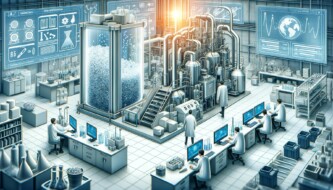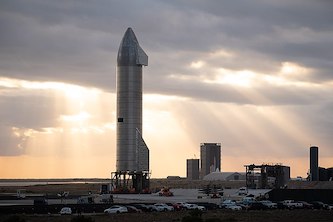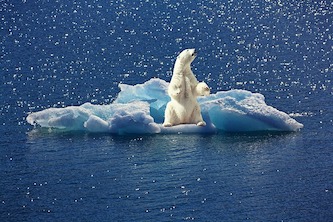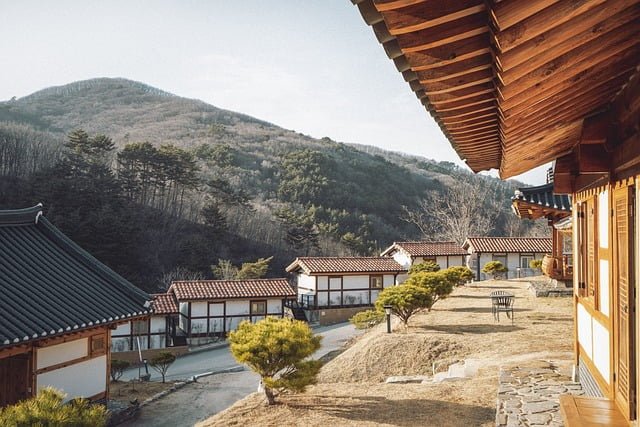A company in France made a special thing that can eat up old plastic. This thing is like what helps tiny bugs eat leaves when they rot. It is really good at eating a kind of plastic that is used to make bottles and clothes. After it eats the plastic, it leaves behind small parts that can be used to make new plastic. The company wants to build a big place where they can eat up lots of old plastic by 2025.
This special thing could help fix a big problem with too much plastic trash. Right now, not much plastic gets used again; most of it gets thrown away or burned. But with this special thing, we can make new plastic without needing new stuff from the ground. The company wants to let other people use their way of eating plastic, so it can be used all over the world. But it might cost more money to make plastic this way, which could make it hard for everyone to start using it.
Original news source: The T-shirt chewing enzyme ready to tackle plastic waste (BBC)
Listen
Slow
Normal
Fast
Group or Classroom Activities
Warm-up Activities:
– Word Association
Instructions: Give each student a piece of paper and ask them to write down as many words as they can think of that are related to plastic. After a few minutes, have them share their words with a partner. Then, as a class, create a word association web on the board using the words they came up with.
– Sketch It
Instructions: Divide the class into pairs. Give each pair a piece of paper and ask them to draw a picture that represents the concept of recycling plastic. After a few minutes, have each pair share their drawing with the class and explain what it represents.
– Vocabulary Pictionary
Instructions: Write a list of vocabulary words from the article on the board, such as “plastic,” “trash,” “rot,” “bottles,” etc. Divide the class into teams and take turns having one student from each team come up to the board. Give each student a word from the list and have them draw a picture to represent the word. The rest of their team must guess the word based on the drawing.
– Speed Summarizing
Instructions: Divide the class into pairs. Give each pair a copy of the article. Set a timer for two minutes and ask the students to read the article silently. When the timer goes off, one student from each pair must summarize the article to their partner in one minute or less. Then, have the pairs switch roles and repeat the activity.
– Keyword Taboo
Instructions: Write a list of key words from the article on the board, such as “plastic,” “company,” “eat,” “new,” etc. Divide the class into two teams and choose one student from each team to come to the front of the class. Without saying the word on the board, the student must describe the word to their team using other words. Their team must guess the word based on the description. The team with the most correct guesses wins.
Comprehension Questions:
1. What did a company in France make?
2. What is the special thing good at eating?
3. What does the special thing leave behind after it eats the plastic?
4. What problem could the special thing help fix?
5. What happens to most plastic right now?
6. How can we make new plastic without needing new stuff from the ground?
7. Why might it be hard for everyone to start using the special thing?
Go to answers ⇩
Listen and Fill in the Gaps:
A company in France made a (1)______ thing that can eat up old plastic. This thing is like what helps tiny bugs eat leaves when they rot. It is really good at eating a (2)______ of plastic that is used to make bottles and clothes. After it eats the plastic, it leaves behind small parts that can be used to (3)______ new plastic. The (4)______ wants to build a big place where they can eat up lots of old plastic by 2025.
This special thing could help fix a big problem with too (5)______ plastic trash. Right now, not much plastic gets used again; most of it gets thrown away or burned. But with this special (6)______, we can make new plastic without needing new stuff from the ground. The company wants to let other people use their way of eating plastic, so it can be used all over the (7)______. But it might cost more money to make plastic this way, which could make it hard for everyone to (8)______ using it.
Go to answers ⇩
Discussion Questions:
Students can ask a partner these questions, or discuss them as a group.
1. What is plastic?
2. How would you feel if there was too much plastic trash everywhere?
3. Do you like the idea of using old plastic to make new plastic? Why or why not?
4. What do you think happens to plastic when it gets thrown away?
5. How do you think this special thing can help fix the problem with too much plastic trash?
6. Do you think it’s a good idea to let other people use this special thing to eat plastic? Why or why not?
7. What do you think might happen if we use this special thing to make new plastic all over the world?
8. How do you think this special thing is different from tiny bugs eating leaves when they rot?
9. Why do you think it might cost more money to make plastic this way?
10. Do you think it’s important to find new ways to use old plastic? Why or why not?
11. What are some things that are made out of plastic?
12. How do you think this special thing works to eat up old plastic?
Individual Activities
Vocabulary Meanings:
Match each word to its meaning.
Words:
1. company
2. special
3. plastic
4. eat
5. old
6. new
7. problem
8. trash
Meanings:
(a) A group of people who work together
(b) A material that is not natural and can be shaped into different things
(c) A difficult situation or challenge
(d) Something that is different or unique
(e) Not young or recent
(f) Waste or unwanted items that are thrown away
(g) To consume or take in food or other substances
(h) Something that has just been made or created
Go to answers ⇩
Multiple Choice Questions:
1. What did the company in France make?
(a) A special thing that can eat up leaves
(b) A special thing that can eat up old plastic
(c) A special thing that can eat up rocks
(d) A special thing that can eat up water
2. What is the special thing good at eating?
(a) A kind of plastic used to make bottles and clothes
(b) A kind of plastic used to make cars and houses
(c) A kind of plastic used to make food and drinks
(d) A kind of plastic used to make toys and games
3. What does the special thing leave behind after eating the plastic?
(a) Small parts that can be used to make new leaves
(b) Small parts that can be used to make new rocks
(c) Small parts that can be used to make new water
(d) Small parts that can be used to make new plastic
4. When does the company want to build a big place to eat up lots of old plastic?
(a) By 2030
(b) By 2020
(c) By 2025
(d) By 2050
5. What problem can the special thing help fix?
(a) Too much paper trash
(b) Too much plastic trash
(c) Too much metal trash
(d) Too much glass trash
6. What usually happens to most plastic right now?
(a) It gets used again and again
(b) It gets turned into new plastic
(c) It gets used to make new things
(d) It gets thrown away or burned
7. What does the company want to do with their way of eating plastic?
(a) Let other people use it all over the world
(b) Keep it a secret and not share it with anyone
(c) Sell it to other companies for a lot of money
(d) Use it only in France and not in other countries
8. Why might it be hard for everyone to start using the special thing?
(a) It might be too easy to use the special thing
(b) It might be too hard to find old plastic to eat up
(c) It might cost more money to make plastic this way
(d) It might be too dangerous to use the special thing
Go to answers ⇩
True or False Questions:
1. A company in France invented something that can eat old plastic.
2. This ordinary thing cannot help address the issue of excessive plastic waste.
3. After devouring the plastic, it produces large parts that cannot be utilized to make new plastic.
4. The special thing is like what bugs use to eat leaves when they rot.
5. It is really good at eating plastic used to make bottles and clothes.
6. The company wants to construct a small place to consume minimal old plastic by 2025.
7. The company wants to share their way of eating plastic with others all over the world.
8. Right now, a significant amount of plastic gets reused; hardly any of it gets discarded or incinerated.
Go to answers ⇩
Write a Summary:
Write a summary of this news article in two sentences.
Check your writing now with the best free AI for English writing!
Writing Questions:
Answer the following questions. Write as much as you can for each answer.
Check your answers with our free English writing assistant!
1. What did a company in France make that can eat up old plastic?
2. What does the special thing leave behind after it eats the plastic?
3. Why is the special thing helpful for fixing a big problem?
4. What usually happens to plastic that is thrown away?
5. Why might it be hard for everyone to start using the special thing to make plastic?
Answers
Comprehension Question Answers:
1. What did a company in France make?
A company in France made a special thing.
2. What is the special thing good at eating?
The special thing is good at eating old plastic.
3. What does the special thing leave behind after it eats the plastic?
After it eats the plastic, the special thing leaves behind small parts.
4. What problem could the special thing help fix?
The special thing could help fix the problem of too much plastic trash.
5. What happens to most plastic right now?
Right now, most plastic gets thrown away or burned.
6. How can we make new plastic without needing new stuff from the ground?
We can make new plastic without needing new stuff from the ground by using the special thing that eats old plastic.
7. Why might it be hard for everyone to start using the special thing?
It might be hard for everyone to start using the special thing because it might cost more money to make plastic this way.
Go back to questions ⇧
Listen and Fill in the Gaps Answers:
(1) special
(2) kind
(3) make
(4) company
(5) much
(6) thing
(7) world
(8) start
Go back to questions ⇧
Vocabulary Meanings Answers:
1. company
Answer: (a) A group of people who work together
2. special
Answer: (d) Something that is different or unique
3. plastic
Answer: (b) A material that is not natural and can be shaped into different things
4. eat
Answer: (g) To consume or take in food or other substances
5. old
Answer: (e) Not young or recent
6. new
Answer: (h) Something that has just been made or created
7. problem
Answer: (c) A difficult situation or challenge
8. trash
Answer: (f) Waste or unwanted items that are thrown away
Go back to questions ⇧
Multiple Choice Answers:
1. What did the company in France make?
Answer: (b) A special thing that can eat up old plastic
2. What is the special thing good at eating?
Answer: (a) A kind of plastic used to make bottles and clothes
3. What does the special thing leave behind after eating the plastic?
Answer: (d) Small parts that can be used to make new plastic
4. When does the company want to build a big place to eat up lots of old plastic?
Answer: (c) By 2025
5. What problem can the special thing help fix?
Answer: (b) Too much plastic trash
6. What usually happens to most plastic right now?
Answer: (d) It gets thrown away or burned
7. What does the company want to do with their way of eating plastic?
Answer: (a) Let other people use it all over the world
8. Why might it be hard for everyone to start using the special thing?
Answer: (c) It might cost more money to make plastic this way
Go back to questions ⇧
True or False Answers:
1. A company in France invented something that can eat old plastic. (Answer: True)
2. This ordinary thing cannot help address the issue of excessive plastic waste. (Answer: False)
3. After devouring the plastic, it produces large parts that cannot be utilized to make new plastic. (Answer: False)
4. The special thing is like what bugs use to eat leaves when they rot. (Answer: True)
5. It is really good at eating plastic used to make bottles and clothes. (Answer: True)
6. The company wants to construct a small place to consume minimal old plastic by 2025. (Answer: False)
7. The company wants to share their way of eating plastic with others all over the world. (Answer: True)
8. Right now, a significant amount of plastic gets reused; hardly any of it gets discarded or incinerated. (Answer: False)
Go back to questions ⇧















